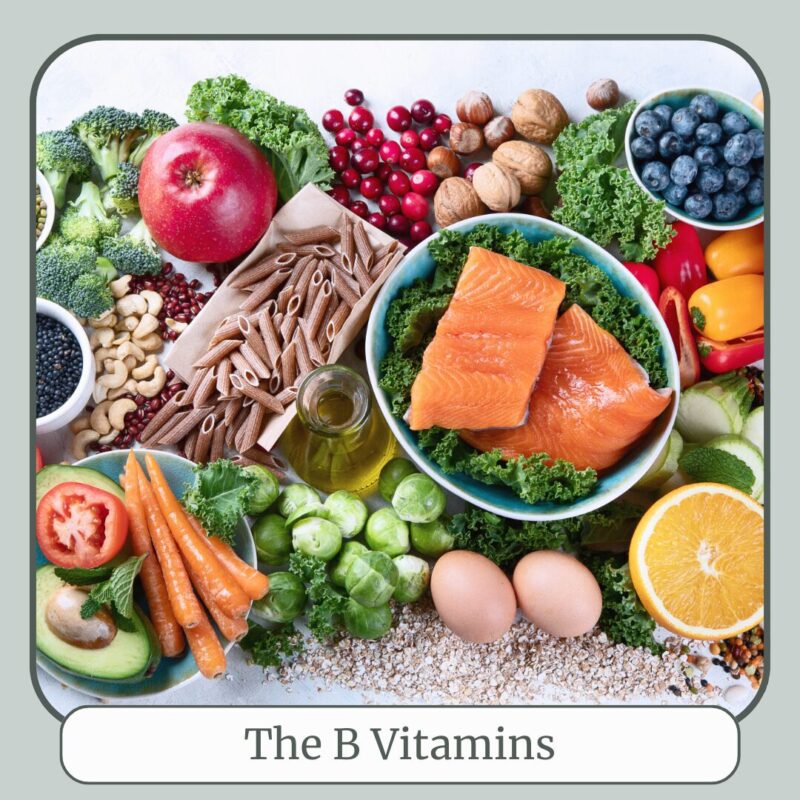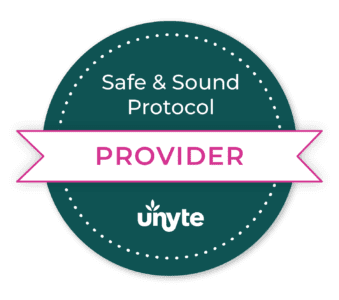When it comes to mental health, few nutrients play as critical a role as the B vitamin family. These eight water-soluble vitamins are the foundation of your brain’s energy production, neurotransmitter synthesis, and overall cognitive function. Whether you’re dealing with stress, fatigue, mood swings, or mental fog, there’s likely a B vitamin working behind the scenes. Yet, despite their importance, deficiencies are surprisingly common, often leading to a range of mental health concerns.
In this post, we’ll dive into the key roles that B vitamins play in your mental well-being, their top food sources, and how to tell if you might need to boost your intake. From B6’s role in mood regulation to B12’s contribution to energy and nerve function, these essential nutrients have wide-reaching effects on both brain and body. Ready to power up? Let’s explore the essentials of B vitamins for brain health.
Table of Contents
The Essentials: What You Need to Know About B Vitamins
The B vitamin family consists of eight distinct vitamins, each with its own set of responsibilities, but all contributing to the greater cause: supporting your brain and body. These include:
- Vitamin B1 (Thiamine): Crucial for converting carbohydrates into energy and keeping the nervous system functioning smoothly.
- Vitamin B2 (Riboflavin): Supports energy production and helps metabolize fats, carbohydrates, and proteins.
- Vitamin B3 (Niacin): Known for its role in energy production and DNA repair, Niacin also contributes to healthy skin and digestion.
- Vitamin B5 (Pantothenic Acid): Key to synthesizing coenzyme A, which is important for fatty acid metabolism and the production of neurotransmitters.
- Vitamin B6 (Pyridoxine): Helps regulate mood by assisting in the production of serotonin, dopamine, and other neurotransmitters. It also supports cognitive development.
- Vitamin B7 (Biotin): Often associated with healthy hair and skin, Biotin is also involved in energy metabolism.
- Vitamin B9 (Folate/Folic Acid): Essential for DNA synthesis, cell growth, and brain function. Folate is especially critical during pregnancy for fetal brain development.
- Vitamin B12 (Cobalamin): Vital for nerve function, DNA synthesis, and the production of red blood cells. B12 also helps prevent fatigue and cognitive decline.
Each of these vitamins is essential to brain functioning and has a direct impact on your mental well-being. Let’s break down their specific roles in mental health next.
The Nutrient in Action: B Vitamins and Mental Health
1. Energy Production and Cognitive Function
B vitamins, particularly B1 (Thiamine), B2 (Riboflavin), and B3 (Niacin), play essential roles in the body’s energy production pathways. These vitamins help convert carbohydrates, proteins, and fats into energy, which fuels not only the body but also the brain. When the brain has the energy it needs, cognitive functions like focus, memory, and problem-solving are more efficient. B1 is critical for glucose metabolism, which ensures that the brain receives a steady supply of energy, preventing mental fatigue and cognitive decline. B2 and B3 also aid in protecting brain cells from oxidative stress, further supporting long-term brain health.
2. Mood Regulation and Emotional Stability
Vitamin B6 (Pyridoxine) is one of the most influential B vitamins when it comes to mood regulation. It aids in the production of neurotransmitters such as serotonin, dopamine, and GABA, which are essential for managing mood and emotional stability. Low levels of B6 can lead to imbalances in these neurotransmitters, contributing to symptoms of depression, anxiety, and irritability. Additionally, B12 (Cobalamin) and Folate (B9) are vital for the methylation process, which influences mood regulation and the brain’s ability to produce mood-stabilizing chemicals.
3. Stress Response and Anxiety Management
Several B vitamins, including B5 (Pantothenic Acid) and B12, are critical for managing the body’s stress response. B5 supports adrenal function, aiding in the production of stress hormones like cortisol. This allows the body to respond to stress in a controlled manner. B12, on the other hand, helps protect the nervous system from stress-related damage by supporting the formation of the myelin sheath, which insulates nerves and prevents them from becoming overstimulated. Deficiency in B12 can lead to heightened feelings of anxiety and stress, as the nervous system becomes less equipped to handle pressure.
4. Nerve Health and Protection
Vitamin B12 and Folate play pivotal roles in maintaining nerve health. B12 supports the production of myelin, the protective coating around nerves, which ensures smooth communication between the brain and body. A deficiency in B12 can result in nerve damage, leading to symptoms such as numbness, tingling, and memory loss. Folate works closely with B12 to prevent homocysteine buildup, a compound that can damage blood vessels and lead to cognitive decline. Together, these vitamins help keep the nervous system healthy and prevent neurodegenerative conditions.
5. Cognitive Decline and Mental Agility
As we age, maintaining mental sharpness becomes increasingly important. Vitamin B9 (Folate) and B12 are both known for their protective roles in preventing cognitive decline. Folate is essential for DNA synthesis and repair, which is critical for the maintenance of healthy brain cells. B12, similarly, helps prevent brain shrinkage and the deterioration of neurons, which can lead to memory problems and cognitive disorders like dementia. Supplementing with these vitamins may improve mental agility and reduce the risk of age-related cognitive impairment.
How to Choose a B Vitamin Supplement: Things to Consider
When looking for the best B vitamins for brain health, there are several factors to keep in mind:
- Full B Complex vs. Individual Supplements
If you’re unsure which B vitamin you need most, consider a full B complex supplement. This will provide all eight B vitamins in balanced amounts. If you know you’re deficient in a specific B vitamin (like B12), a standalone supplement might be more effective. - Bioavailability
Not all B vitamins are created equal. Look for activated forms of B vitamins, such as methylcobalamin for B12 and pyridoxal-5-phosphate for B6. These forms are more easily absorbed and used by your body compared to synthetic versions. - Testing and Dosage
If you suspect a deficiency, consider getting your B vitamin levels tested before supplementing. This can help you avoid taking unnecessary or excessive doses, which may lead to imbalances. Be mindful of the recommended daily allowances and consult a healthcare provider for guidance. - Vegan and Vegetarian Options
If you follow a plant-based diet, make sure to choose a vegan-friendly B12 supplement. B12 is naturally found in animal products, so those on vegan or vegetarian diets are at a higher risk of deficiency. - Quality and Purity
Always opt for high-quality supplements from reputable brands. Look for products that are third-party tested for purity and potency. Avoid supplements with unnecessary fillers, artificial colors, or preservatives.
Top 10 Food Sources of B Vitamins
- Leafy Greens (Spinach, Kale) – High in Folate (B9) and Riboflavin (B2)
- Eggs – A great source of Biotin (B7), B12, and B2 (learn more about the nutrition benefits of pasture raised eggs here)
- Legumes (Lentils, Chickpeas, Beans) – Rich in Folate (B9), Thiamine (B1), and Pantothenic Acid (B5)
- Salmon – High in B12, B6, and Niacin (B3)
- Fortified Cereals – Provide a range of B vitamins, especially B12 and Folate
- Nuts and Seeds (Sunflower Seeds, Almonds) – Good sources of B6, Niacin (B3), and Pantothenic Acid (B5)
- Whole Grains (Brown Rice, Oats) – Contain Thiamine (B1), Niacin (B3), and Riboflavin (B2)
- Beef and Chicken – Packed with B12, Niacin (B3), and B6
- Milk and Dairy – Rich in Riboflavin (B2), B12, and Pantothenic Acid (B5)
- Avocados – Provide Folate (B9) and Pantothenic Acid (B5)
Get Your Fix: 3 Delicious B Vitamin-Rich Recipes
1. Meat Recipe: Beef and Spinach Stir-Fry with Garlic
- Ingredients:
- 1 lb beef strips
- 2 cups fresh spinach
- 2 tablespoons olive oil
- 3 cloves garlic, minced
- 1 tablespoon soy sauce
- Salt and pepper to taste
- Directions:
- Heat the olive oil in a large pan over medium heat. Add the beef and garlic, cooking until browned.
- Stir in the spinach and soy sauce, and cook until the spinach wilts.
- Season with salt and pepper and serve over brown rice for an extra B vitamin boost.
2. Vegetarian Recipe: Lentil and Chickpea Salad with Lemon Dressing
- Ingredients:
- 1 cup cooked lentils
- 1 can chickpeas, drained
- 1 cucumber, diced
- 1 bell pepper, chopped
- 1 tablespoon olive oil
- Juice of 1 lemon
- Salt and pepper to taste
- Directions:
- Mix the lentils, chickpeas, cucumber, and bell pepper in a bowl.
- Drizzle with olive oil and lemon juice, and toss to combine.
- Season with salt and pepper and serve chilled.
3. Vegan Recipe: Avocado Toast with Nutritional Yeast
- Ingredients:
- 1 ripe avocado
- 2 slices whole-grain bread
- 1 tablespoon nutritional yeast
- Pinch of sea salt
- Crushed red pepper flakes (optional)
- Directions:
- Toast the bread to your liking.
- Mash the avocado onto the toast and sprinkle with nutritional yeast, sea salt, and red pepper flakes.
Enjoy a quick and delicious B vitamin-rich breakfast!
-

Rachel Plympton, LCSW, brings 14+ years of expertise to her mission of creating lasting, whole-body wellness. Using a dynamic blend of Play Therapy, Cognitive Behavioral Therapy, Mindfulness, EMDR, and Safe and Sound Protocol™ (SSP), she helps clients break through barriers and achieve meaningful change. Rachel also offers Wellness Panels that reveal powerful insights into the link between mental and physical health. Whether working with children, teens, or adults, Rachel is dedicated to guiding her clients in transformation and resilience.
View all posts
 (281) 305-9387
(281) 305-9387









